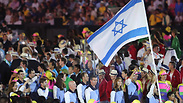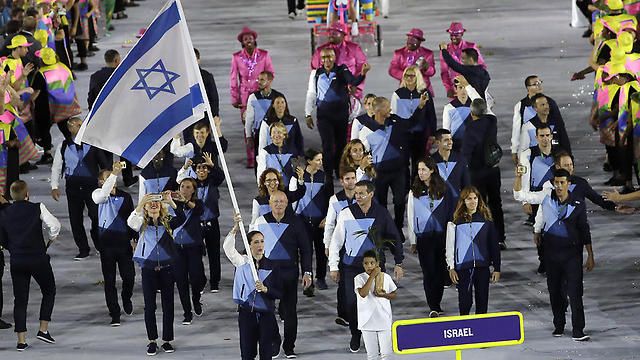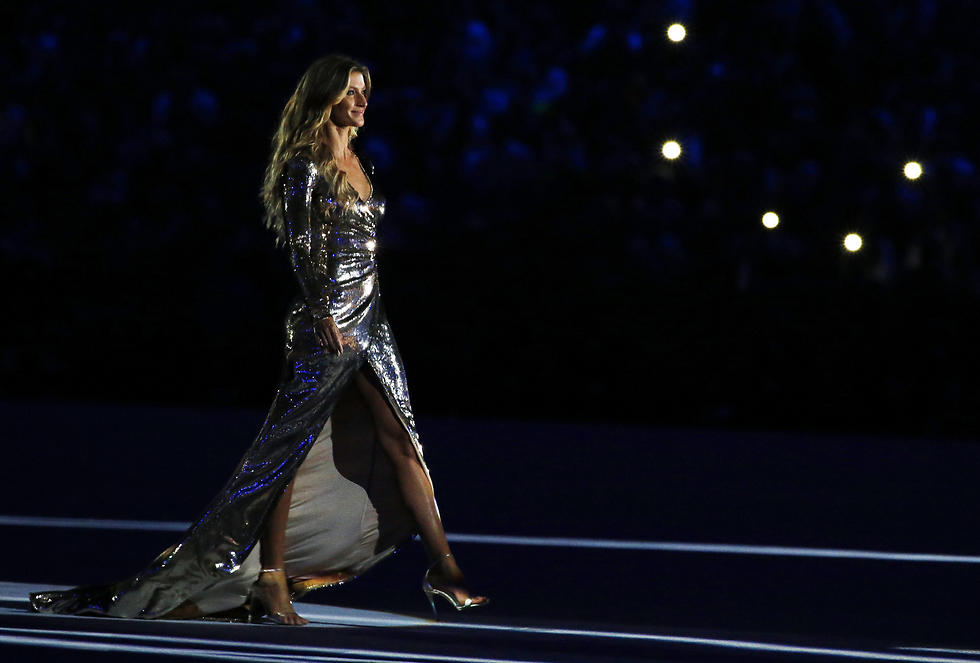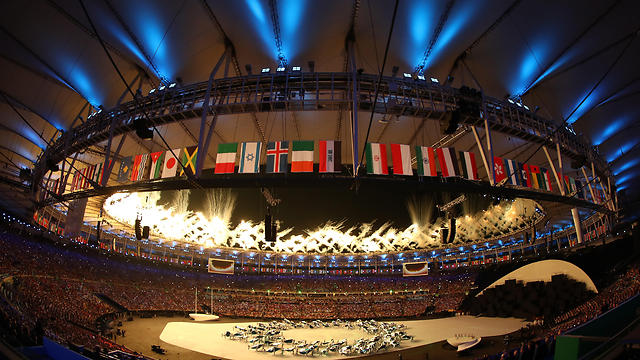
Brazil casts aside crisis in rousing Rio Games opening
The 2016 Summer Olympics are officially underway in South America’s largest country. The delegations took part in the traditional ceremony Friday night. Rhythmic gymnast Neta Rivkin carried the Israeli flag.
Among many participating in the ceremony was the Israeli delegation, led by flag-bearer and rhythmic gymnast Neta Rivkin. Many other members of the delegation bore smaller flags – painted on their faces.
Brazil's interim President Michel Temer declared open the first Games ever in South America. But in a display of the deep political divisions plaguing Brazil, he was jeered by some in the crowd at the famed Maracana soccer stadium.
The opening ceremony was decidedly simple and low-tech, a reflection of Brazil's tough economic times. In one of the world's most unequal societies, the spectacle celebrated the culture of the favelas, the slums that hang vertiginously above the renowned beaches of Rio and ring the Maracana.
There was no glossing over history either: from the arrival of the Portuguese and their conquest of the indigenous populations to the use of African slave labor for 400 years. The clash of cultures, as the ceremony showed, is what makes Brazil the complex mosaic that it is.
Home to the Amazon, the world's largest rainforest, Brazil used the ceremony to call on the 3 billion people watching the opening of the world's premiere sporting event to take care of the planet, plant seeds and protect the verdant land that Europeans found here five centuries ago.
Brazilian marathon runner Vanderlei Cordeiro de Lima, a bronze medalist in Athens in 2004 (who was attacked during the marathon while he was in the lead by a mentally unstable Irish spectator, which many believe cost him the gold medal), lit the Olympic cauldron, a small and low-emission model befitting the environmental theme of these Games. 75-year-old Brazilian soccer legend Pele was rumored to be favored for lighting the torch, but had to drop our from participating in the ceremony entirely due to health concerns.
Unlike the opening ceremonies in Beijing in 2008 and London in 2012, a financially constrained Brazil had little choice but to put on a more "analog" show, with minimal high-tech and a heavy dependence on the vast talent of Brazil and its Carnival party traditions. In the nearly four-hour event, nothing appeared to go awry.
While the Rio 2016 organizing committee has not said how much the ceremony cost, it is believed to be about half of the $42 million spent by London in 2012.
The show drew homegrown stars, like supermodel Gisele Bundchen, who walked across the stadium to the sound of bossa nova hit "Girl from Ipanema" and tropicalia legends Caetano Veloso and Gilberto Gil. Everyone performed for free. The creative minds behind the opening ceremony were determined to put on a show that would not offend a country in dire economic straits but would showcase the famously upbeat nature of Brazilians.
Loud cheering erupted when two of the last teams entered the stadium: the first Refugee team in Olympic history and finally a samba-dancing Brazil contingent.
The joyful opening contrasted with months of turmoil and chaos, not only in the organization of the Olympics but across Brazil as it endures its worst economic recession in decades and a deep political crisis.
Temer, flanked by dozens of heads of state, played a minor role in the ceremony, speaking just a few words. The leader who was supposed to preside over the Games, President Dilma Rousseff, was suspended in May to face an impeachment trial and tweeted that she was "sad to not be at the party."
The $12 billion price tag to organize the Games has aggrieved many in the nation of 200 million and in Rio, where few can see the benefits of the spectacle or even afford to attend the Games.
Due to Brazil's most intense security operation ever, some among the 50,000 attendees faced two-hour-long lines.
Nadav Zenziper and Oren Aharoni contributed to this story.














